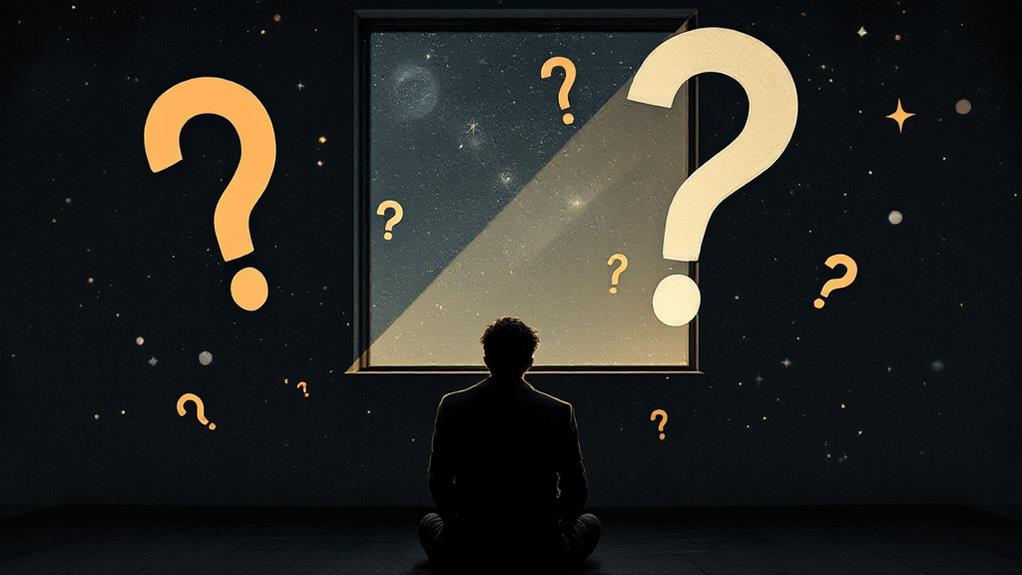What Is Cartesian Skepticism?

Cartesian Skepticism challenges your understanding of certainty and knowledge, as inspired by Renée Descartes. He looked for a foundation of doubtless knowledge, using methods like the Evil Demon hypothesis and Dream argument to question what you can truly know. Descartes argued that senses might deceive you, and true knowledge must be indubitable. His famous "Cogito, ergo sum" ("I think, thus I am") exemplifies this pursuit of certainty. This approach has influenced debates on knowledge and skepticism, prompting you to reflect on the limits of belief. There's much more to the philosophical impact this has today.
Origins of Cartesian Skepticism
At the heart of Cartesian skepticism lies the philosophical inquiry initiated by René Descartes in the 17th century. You might wonder how this skepticism emerged. It didn't spring up in a vacuum; rather, it was deeply rooted in the historical context of Descartes' time. During this period, Europe was experiencing a shift in thought, marked by the Scientific Revolution. This span of intellectual change is reminiscent of the ongoing evolution of AI, which likewise challenges traditional concepts and opens new avenues of understanding. Traditional beliefs were being questioned, and new ways of understanding the world were gaining traction. Descartes, witnessing this intellectual upheaval, sought to find a foundation of certainty in knowledge, free from doubt.
In your exploration of Cartesian skepticism, you'll find that its philosophical implications are profound. Descartes introduced the method of radical doubt, urging you to question the validity of everything you know. He famously asked, "What can be called into doubt?" By challenging the reliability of the senses and the certainty of the external world, Descartes paved the way for modern philosophy. His skepticism didn't just stop at doubting external perceptions; it also questioned the very nature of reality and knowledge itself. This approach forces you to reconsider the foundations of your beliefs, highlighting the limits of human understanding.
Descartes' Philosophical Background

To understand Descartes' philosophical background, you need to investigate the intellectual milieu that shaped his thinking. During the 17th century, Europe was a melting pot of ideas, where traditional Scholasticism clashed with emerging scientific revelations. Descartes, a pioneering thinker, was deeply influenced by this dynamic environment. His approach was characterized by a departure from the heavily Aristotelian framework of the medieval period, moving towards a more modern perspective. Rationalist influences played a significant role in Descartes' development. He believed that reason, rather than sensory experience, was the primary source of knowledge. This emphasis on reason led him to question established beliefs and seek a foundation for certainty. Descartes' famous Methodical doubt was a tool he employed to systematically question and scrutinize his own beliefs, aiming to discard any that were not absolutely certain. Just as pseudoscience remains static, Descartes saw the need for evolving and questioning knowledge to prevent intellectual stagnation.
Key elements of his philosophical background include:
- Mathematical precision: Descartes sought to apply mathematical techniques to philosophical inquiry.
- Scientific revolution: Exposure to new scientific methods encouraged a shift from tradition.
- Rationalism: Prioritizing reason over empirical evidence in the search for truth.
Understanding these influences helps you appreciate how Descartes laid the groundwork for modern philosophy.
Key Concepts in Cartesian Doubt

Descartes' methodical approach to skepticism is central to the key concepts in Cartesian doubt. When you explore Descartes' philosophy, you'll find that he challenges the reliability of your senses and the truths you take for granted. His goal is to establish a firm foundation for knowledge—something beyond doubt. To achieve this, Descartes introduces the concept of epistemic certainty, the idea that you should only accept beliefs that are absolutely indubitable.
You might wonder how Descartes identifies such beliefs. He begins by doubting everything not supported by foundational knowledge. For Descartes, foundational knowledge is that which remains unshakable even under the most intense scrutiny. He famously arrives at "Cogito, ergo sum" ("I think, thus I am") as a primary example of foundational knowledge. This statement survives his rigorous doubt because even doubting its truth affirms your existence as a thinking entity.
The Evil Demon Hypothesis

Imagine a scenario where an evil demon deceives you at every turn, manipulating your perceptions and thoughts. This concept, introduced by Renée Descartes, challenges your understanding of reality. The evil demon hypothesis asks you to contemplate that every belief, sensation, and perception could be an illusion crafted by a malevolent force. This idea isn't just a spooky tale; it has serious philosophical implications. It forces you to question the certainty of anything you believe to be true.
Contemplate the ways this hypothesis impacts your thinking:
- Doubt Foundation: It establishes a radical form of skepticism, questioning the reliability of your senses.
- Mind-Body Problem: It highlights the separation between mind and body, suggesting that your mental experiences might not reflect physical reality.
- Epistemological Inquiry: It pushes you to re-evaluate the sources and validity of your knowledge.
The evil demon hypothesis serves as a metaphor for the ultimate challenge of skepticism. It's a tool that helps you confront the limits of human understanding and the vulnerability of your beliefs to deception. By imagining this scenario, you're encouraged to seek a firmer foundation for knowledge—one that withstands even the most cunning deceptions.
The Dream Argument Explained

Exploring the nature of dreams reveals another layer of skepticism in Cartesian philosophy. Renée Descartes, a key figure in this philosophical domain, questioned the reliability of our senses through the dream argument. You might find yourself in a dream that feels incredibly real. But how can you be sure you're not dreaming right now? This intriguing possibility challenges the certainty of your perception of reality.
In dream analysis, you often encounter vivid experiences that seem indistinguishable from waking life. Descartes used this phenomenon to illustrate that if your senses can deceive you in dreams, they might also deceive you when awake. The boundary between dreaming and waking becomes blurred, casting doubt on what you perceive as real.
As you ponder this, consider how often dreams can reflect reality with remarkable accuracy or present fantastical scenarios that feel genuine. Descartes invites you to question the foundation of your beliefs about the external world: If you can't definitively prove you're not dreaming, how can you trust your senses? This unsettling thought encourages a deeper examination of what you accept as reality, pushing you to seek more reliable foundations for knowledge.
Impact on Modern Philosophy

Frequently, Cartesian skepticism profoundly influences modern philosophical thought by challenging the reliability of sensory perception and the certainty of knowledge. This skepticism compels you to question the very foundations of what you believe to be true. When you investigate its impact on modern philosophy, you encounter significant epistemological implications that continue to resonate with contemporary thinkers. Philosophical skepticism, rooted in Descartes' ideas, pushes you to reconsider the essence of reality and your place within it.
Consider how Cartesian skepticism has shaped key philosophical developments:
- Empiricism: Encourages the reliance on experience and evidence while acknowledging the limits of sensory data.
- Rationalism: Promotes reason as the primary source of knowledge, challenging you to find truths beyond empirical evidence.
- Phenomenology: Focuses on the structures of experience and consciousness, urging you to dissect and understand perception itself.
These developments illustrate how Cartesian skepticism has prompted philosophers to grapple with questions about what can genuinely be known. By addressing these issues, you engage in a broader dialogue about the nature of reality and knowledge. Ultimately, this skepticism invites you to critically analyze the assumptions underlying your understanding, fostering a more profound, nuanced perspective.
Responses to Cartesian Skepticism

When you investigate the responses to Cartesian skepticism, you'll find philosophers have devised different strategies to counter its challenging propositions. One approach is embracing epistemic humility, acknowledging our knowledge limits without succumbing to complete doubt. By accepting that some certainty challenges are insurmountable, you can still justify certain beliefs through practical reasoning. This stance doesn't claim absolute truth but underscores a balanced perspective on what can be known.
To navigate the philosophical implications of Cartesian skepticism, you might consider how doubt frameworks question perception reliability. Philosophers like G.E. Moore argue that everyday experiences provide a basis for rejecting radical skepticism. By trusting your senses within a reasonable context, you assert belief justification despite inherent uncertainties. This doesn't guarantee infallibility but supports a pragmatic focus on functioning in the world with coherent truth claims.
Moreover, the coherence theory of truth suggests that beliefs are justified when they cohere with a larger system of beliefs. This approach proposes that while individual perceptions might be unreliable, the general consistency of your experiences can lend credence to your understanding. By focusing on coherent belief systems, you can address skepticism's challenges without dismissing all knowledge.
Criticisms and Counterarguments

Critics of responses to Cartesian skepticism argue that these strategies often fall short of addressing the core issues raised by radical doubt. You might find that traditional responses like foundationalism or coherentism don't fully dissolve the epistemic uncertainty that Descartes highlights. These responses often attempt to establish a basis for certain knowledge, but skeptics insist they don't adequately address the challenge of proving the reliability of that basis itself.
When examining these criticisms, consider:
- Epistemic Circularity: Many responses rely on assumptions that themselves require justification, creating a circular reasoning problem.
- Philosophical Implications: Accepting that foundational beliefs are immune to doubt may lead to ignoring the broader philosophical implications of skepticism.
- Inescapable Doubt: Some argue that responses to Cartesian skepticism fail because they don't eliminate the fundamental doubts about our sensory experiences and the external world.
Understanding these criticisms reveals the complexity of addressing Cartesian skepticism. By grappling with these counterarguments, you recognize that the philosophical implications extend beyond theoretical exercises. They challenge how you perceive certainty and knowledge itself. As you navigate these criticisms, consider if any response can truly dispel the shadows of doubt cast by Cartesian skepticism or if some level of epistemic uncertainty is an inescapable part of human cognition.
Cartesian Skepticism in Today's World

In the current rapidly evolving world, Cartesian skepticism remains an vital consideration, especially amidst technological advancements and the increasing reliance on online information. As online knowledge becomes the backbone of modern life, you must critically evaluate the sources and authenticity of what you encounter on the internet. Virtual reality blurs the line between what's real and what's fabricated, making it even more important to question your perceptions and experiences.
Artificial intelligence further complicates this landscape. AI systems can generate content that appears authentic, yet it's significant to remember these are machine-driven processes that may lack context or understanding. Regardless of whether it's deepfake videos or AI-generated articles, you should apply a skeptical approach to discern truth from fabrication.
Social media platforms also amplify the need for Cartesian skepticism. They're powerful tools for sharing information but can spread misinformation just as quickly. As you scroll through your feed, question the credibility of what you see. Consider the sources, motivations, and potential biases behind the content.
In this online era, embracing Cartesian skepticism empowers you to navigate the complexities of your virtual environment with a discerning mind and a critical eye.



